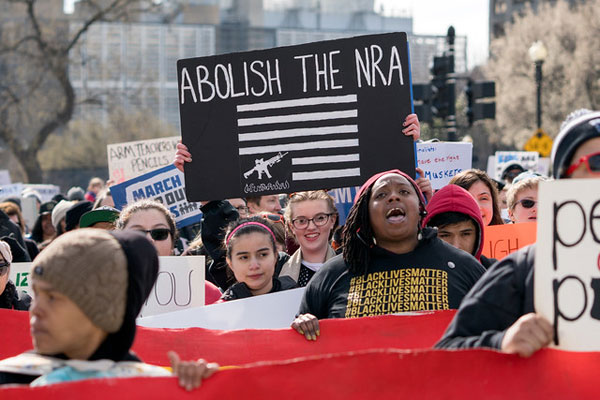
May 3, 2019; PBS NewsHour
The conclusion of the annual meeting of the National Rifle Association (NRA) brought a lot of bad publicity that left the impression of an organization under threat. A leadership dispute saw its longtime executive vice president Wayne LaPierre emerge with a new contract, in firm control of the organization, and former president Oliver North departing in the wake of allegations of serious mismanagement. Now that the convention has ended and the leadership battle is over, attention turns to the IRS and New York state’s attorney general Letitia James, who will have to sort out the details and decide what if any punishment is due the NRA.
As NPQ has previously reported, the NRA has found itself in serious financial difficulty and in a contentious relationship with a major contractor. Prompted by these revelations and a complaint filed by Everytown for Gun Safety, James launched an investigation. However, warnings of the imminent demise of the NRA may be quite premature. Even if the most serious charges turn out to be true, the penalties the organization may face may not threaten the organization’s future. On the PBS NewsHour, tax expert Philip Hackney called the idea of the IRS stripping the NRA of its tax-exempt status “unlikely” and called the possibility that the authorities might shut it down entirely “slight,” though he acknowledged that officers or board members might be removed or have to step down.
The specific allegations are quite alarming. For the NRA’s 501c4 or its foundation’s 501c3 classifications to be at risk, one would have to prove it misused its resources by diverting them away from activities that “defend and foster the Second Amendment rights of all law-abiding Americans.” NRA’s leadership has been accused of illegally using organizational resources to enrich themselves and a favored contractor. They also have been accused of engaging in impermissible electoral activities by serving as a conduit for Russian funding to reach the 2016 Trump campaign organization.
Hackney notes that regulators don’t want to punish the membership of an organization for the misdeeds of its leaders.
Sign up for our free newsletters
Subscribe to NPQ's newsletters to have our top stories delivered directly to your inbox.
By signing up, you agree to our privacy policy and terms of use, and to receive messages from NPQ and our partners.
When nonprofit regulatory authorities detect improprieties, they try to avoid shuttering tax-exempt organizations. They recognize that most people who belong to and support those groups had nothing to do with the wrongdoing. Where possible, they punish wrongdoers without jeopardizing a nonprofit’s viability.
Hackney thinks that even a finding of wrongdoing would have only limited impact—fines, perhaps, and “assurances from the NRA to take appropriate corrective actions to ensure it doesn’t serve as a conduit for foreign campaign cash again.”
The NRA is incorporated in New York, and the state’s Democratic governor and attorney general have a different political agenda than either the NRA or its voluble supporter, President Trump. James said in a statement that she’s “focused on enforcing the rule of law. In any case we pursue, we will follow the facts wherever they may lead. We wish the President would share our respect for the law.”
As significant as these misconduct allegations appear, the more significant challenge to the NRA may be the rise of effective and well-funded organizations that support stricter gun control measures and are ready to take on the NRA head-on. With the backing of former NYC mayor Michael Bloomberg’s wealth, an effective effort has been systematically mounted to rival the NRA’s proficiency and power.
“We are in the fight for our political lives here at the National Rifle Association,” LaPierre declared. “But I promise you, in the spirit of true patriots, we are fighting back.” While regulators look at how well the organization adhered to the tax code, the real battle will take place in legislative hallways and in upcoming elections.—Martin Levine













